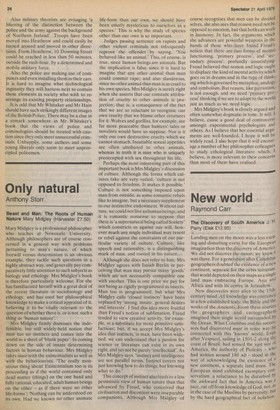Only natural
Anthony Storr
Beast and Man: The Roots of Human Nature Mary Midgley (Harvester £7.50) Mary Midgley is a professional philosopher who teaches at Newcastle University. Although philosophers are of course concerned in a general way with problems pertaining to man's nature, of which freewill versus determinism is an obvious example, they tackle such questions in a highly abstract way. and generally pay comparatively little attention to such subjects as biology and ethology. Mrs Midgley's book is therefore particularly welcome. For she has familiarized herself with a great deal of the recent literature in sociobiology and ethology, and has used her philosophical knowledge to make a critical appraisal of it. believing it to be vitally relevant to the question of whether there is. or is not, such a thing as 'human nature'.
Mrs Midgley firmly dismisses the indefensible, but still widely-held notion that man has no instincts and comes into the world as a sheet of 'blank paper'. In coming down on the side of innate determining factors in human behaviour. Mrs Midgley takes issue with the existentialists as well as with the behaviourists. 'The really monstrous thing about Existentialism too is its proceeding as if the world contained only dead matter (things) on the one hand and fully rational. educated, adult human beings on the other — as if there were no other life-forms'; 'Nothing can be understood on its own. Had we known no other animate life-form than our own, we should have been utterly mysterious to ourselves as a species.' This is why the study of species other than our own is so important.
Judges passing sentence on rapists and other violent criminals not infrequently reprove the offender by saying, 'You behaved like an animal.' This, of course, is true, since human beings are animals. But the implication is false, since it is hard to imagine that any other animal than man could commit rape; and also slanderous, since no other animal than man is as cruel to his own species. Mrs Midgley is surely right when she asserts that our constant attribution of cruelty to other animals is projection; that is. a consequence of the fact that we are so reluctant to recognise our own cruelty that we blame other creatures for it. Wolves and gorillas, for example, are far more peaceable than hunters' tales or novelists would have us suppose. Nor is it only our own destructive cruelty which we cannot stomach. Insatiable sexual appetites are often attributed to other animals, whereas in truth it is man who is uniquely preoccupied with sex throughout his life.
Perhaps the most interesting part of this important book is Mrs Midgley's discussion of culture. Although the forms which cultures take are very varied, 'culture is not opposed to freedom. It makes it possible.' Culture is not something imposed upon man from outside, as some romantic rebels like to imagine, but a necessary supplement to our instinctive endowment. Without culture, we could not live as human beings; and it is romantic nonsense to suppose that there is 'a supernatural being called Society' which constricts us against our will, however much any single individual may resent or rebel against the constraints of our particular variety of culture. Culture,. like speech and rationality, is a distinguishing mark of man, and rooted in his nature.
Although she does not refer to him, Mrs Midgley agrees with Isaiah Berlin in perceiving that man may pursue many `goods' which are not necessarily compatible one with another. This is one price we pay for not being as rigidly programmed as insects. Man too is programmed; but what Mrs Midgley calls 'closed instincts' have been replaced by 'strong, innate, general desires and interests'. I find this idea more fruitful than Freud's notion of sublimation. Freud tended to view creative activity, for example, as a substitute for more primitive satisfactions; but, if we accept Mrs Midgley's idea that instincts, in man, have been widened, we can understand that a passion for science or literature can exist in its own right, and yet not be purely 'intellectual'. As Mrs Midgley says, 'instinct and intelligence are not parallel terms. Instinct covers not just knowing how to do things, but knowing what to do.'
This concept of instinct also leads to a less pessimistic view of human nature than that advanced by Freud. who conceived that civilisation and discontent were inseparable companions. Although Mrs Midgley of course recognises that men can be divided selves, she also sees that reason need not be opposed to emotion, but that both can work in harmony. In fact, the arguments which she advances are powerful weapons in the hands of those who have found Freud's notion that there are two forms of mental functioning, 'primary process'. and 'secondary process'. profundly unsatisfying. Freud believed that reason and logic ought to displace the kind of mental activity which goes on in dreams and in the type of think. ing which is governed by metaphor,. analogy and symbolism. But reason, like patriotism. is not enough, and we need 'primary process' thinking if we are to adapt to the world just as much as we need logic. Mrs Midgley's book is closely argued and often somewhat dogmatic in tone. It will. I believe, cause a good deal of controversy amongst experimental psychologists and others. As I believe that her essential arguments are well-founded. I hope it will be widely read. I also hope that it will encourage a number of her philosopher colleagues to study ethological literature which. I believe, is more relevant to their concerns than most of them have realised.






































 Previous page
Previous page